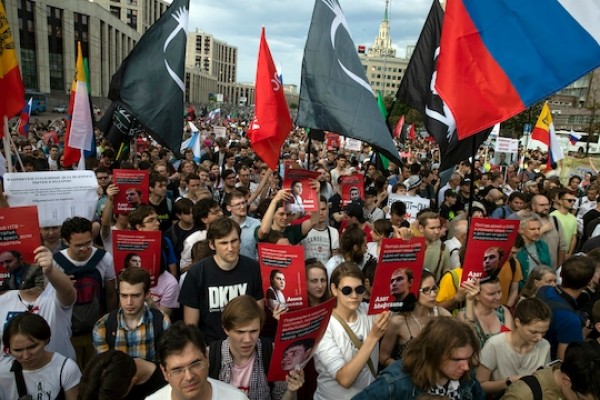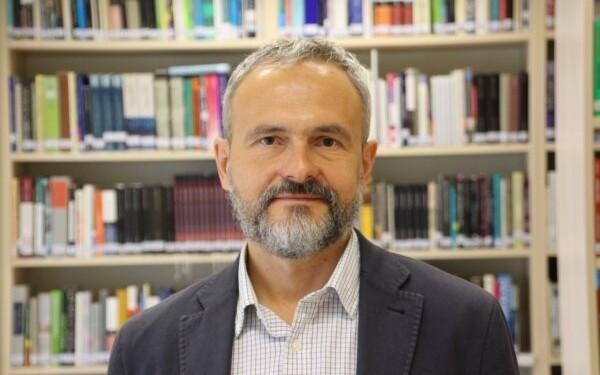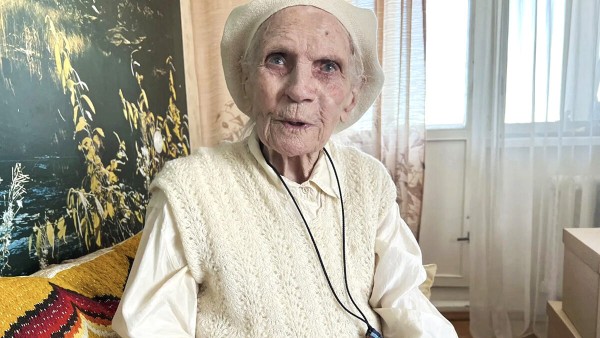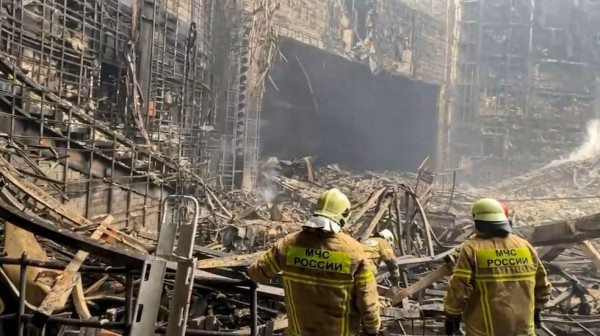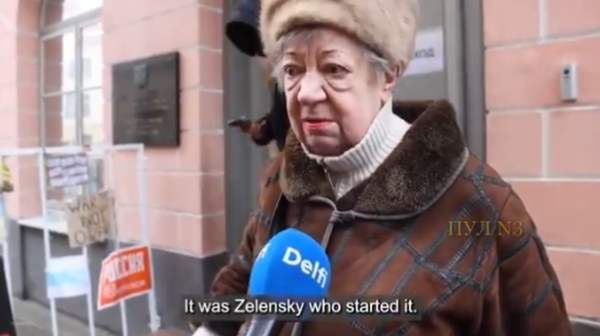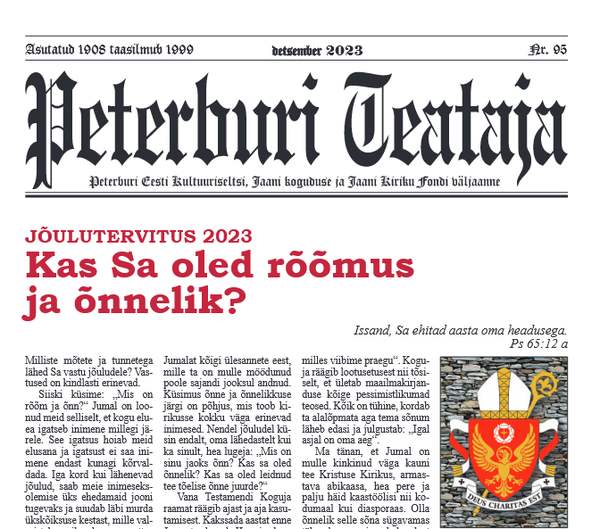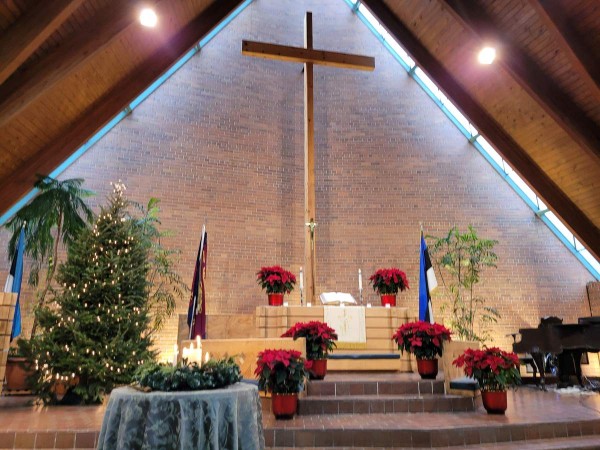MOSCOW — On Saturday, memorial vigils were held across Russia to mark the Day of Commemoration for the Victims of Political Repression. Since the mid-1970s, at dissidents’ behest, prisoners of conscience across the Soviet Union marked Oct. 30 with hunger strikes, while their friends and supporters demonstrated in solidarity — including, at one point, forming a human chain around the KGB building itself. Back then, it was known as Political Prisoner Day.
The Russian legislature’s decision to formalize the day in 1991, as the Soviet regime was in its final throes, was unprecedented — never before had a date chosen by prisoners been granted official status. The change in name seemed logical, too. Russia was striving for democracy and openness; surely, political prisoners would remain a thing of the past.
Three decades on, alas, the date is no longer commemorative. According to last week’s report by Memorial, Russia’s leading human rights group, there are 420 political prisoners in the country — by some accounts, twice as many as in the late Soviet period. The list is, by Memorial’s own admission, incomplete, as it includes only cases vetted by the organization — and only those that correspond to the strict definition of a “political prisoner” established by the Council of Europe and adopted by the Organization for Security and Cooperation in Europe, both of which include Russia as a member.
Many of these cases were highlighted at a conference I co-chaired with Memorial and the Sakharov Center last week — as we do around this time every year — to bring attention to the plight of Russia’s political prisoners. The diverse list includes Vladimir Putin’s most prominent rival; opposition activists prosecuted under new laws on “extremist” and “undesirable” organizations; peaceful protesters jailed for demonstrating without approval by the authorities; the last hostage of Putin’s personal vendetta against his exiled critic Mikhail Khodorkovsky; Crimean Tatars who opposed the Kremlin’s annexation of their homeland; young Muslims baselessly accused of “terrorism” and given breathtaking prison terms, often in excess of 20 years; and Jehovah’s Witnesses who are outlawed in Putin’s Russia just as they were in Nazi Germany and the Soviet Union. And the list goes on.
“Institutionally, today’s repressions have still not reached the Soviet level, but we are heading firmly in that direction,” Alexander Podrabinek, a prominent journalist and prisoner of conscience in the 1970s and 1980s, told Echo of Moscow radio last week. “People are being convicted not for committing any offenses but because security services believe them to be disloyal to the authorities.”
Just as in Soviet times, international advocacy is often the last line of defense for those who are imprisoned at the whim of an authoritarian regime. Arbitrary detention for political or religious reasons violates not just domestic laws but also Russia’s international commitments under the Council of Europe and the OSCE, giving other member states (including, in the latter case, the United States) an obligation to act. Last year, Congress unanimously urged the U.S. government “to raise individual cases of Russian political prisoners and advocate for their release,” and raised the prospect of imposing sanctions on Kremlin officials responsible for politically motivated prosecutions. Last week, in a pointed gesture, the most senior U.S. diplomat then in Moscow attended our conference, publicly calling for the release of Russian political prisoners.
Western leaders can do more, including personally advocating for political prisoners in their meetings with Kremlin leaders. Such advocacy can, at the very least, improve these prisoners’ conditions, and at best pave the way for their release. Some of the most prominent Soviet-era prisoners of conscience — including Vladimir Bukovsky, Yuri Orlov, Anatoly Sharansky and Alexander Ginzburg — were freed as a result of direct interventions by American presidents of both parties. More recently, the leaders of Germany and France helped secure the freedom for two of Putin’s most prominent prisoners, Khodorkovsky and Crimean filmmaker Oleg Sentsov. “Giving freedom to a human being,” Secretary of State George Shultz wrote President Ronald Reagan after he negotiated for a group of religious dissenters to leave the USSR, “is a gift of great wonderment.”
For Russia itself, the lesson of 30 years ago is equally clear. Preoccupied by the urgent needs of political liberalization and economic reforms, the country’s democratic leaders of the 1990s neglected — through inability or unwillingness — a fundamental requirement of successful post-totalitarian transformation: a proper reckoning with the past. Unlike other countries in Eastern Europe, Russia never went through a full process of decommunization and lustration, opening the archives, disbanding the old security services, publicizing the crimes of the former regime and making it impossible for their perpetrators ever to return to positions of power. “We don’t need witch hunts” was a popular argument offered at the time. The most farsighted of Russian democrats — including Bukovsky and lawmaker Galina Starovoitova — warned that the witches would soon return and start a hunt of their own. They turned out to be exactly right.
One day, in some form, Russia will get another chance at democratic transition, and it is imperative that this mistake not be repeated. Perhaps Oct. 30 will yet become a day of commemoration, after all.
https://www.washingtonpost.com...
Russia’s political prisoners are no longer a thing of the past
Eestlased Venemaal | 05 Nov 2021 | Vladimir Kara-MurzaEWR
Eestlased Venemaal
TRENDING






